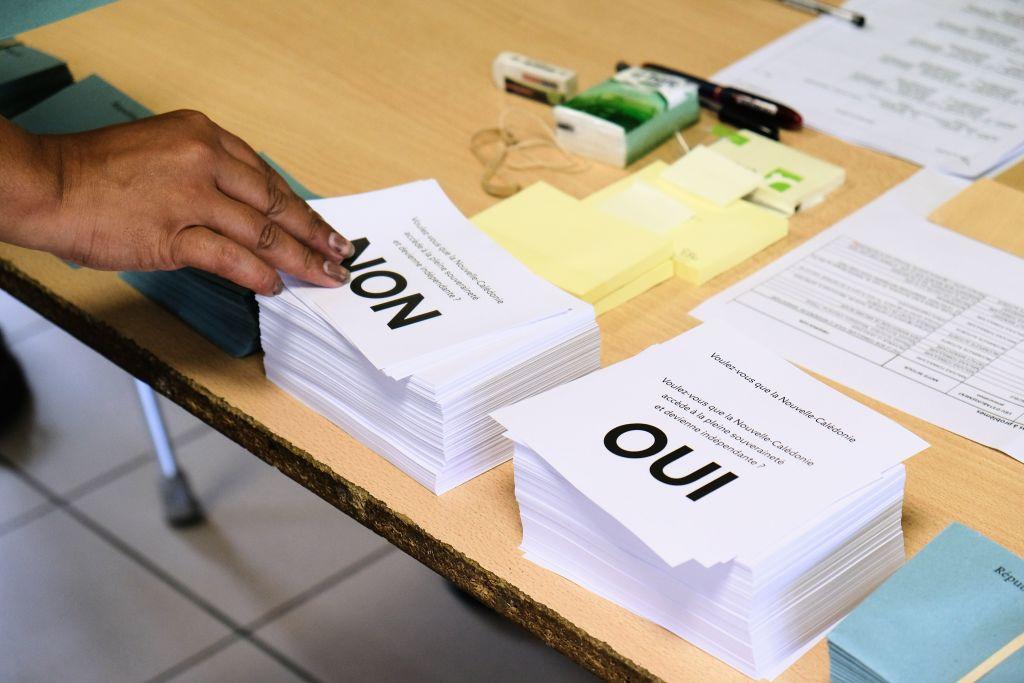France under pressure in New Caledonia
Posted By Denise Fisher on December 8, 2021 @ 12:30

France’s valued role in the Indo-Pacific is under pressure, as it proceeds with its own plans for settling the future of New Caledonia in apparent disregard for the local practices of its indigenous Kanak communities, undermining a 30-year process for peace and stability in the territory and arguably in the wider region.
On 12 December, the last of three independence votes is to be held under the 1998 Noumea Accord, [1] one of a series of agreements that ended serious civil disturbances over independence in the 1970s and 1980s. Those protests included a boycott of a referendum in 1987 and culminated in a bloody exchange in a cave on the island of Ouvea in which 21 people were killed. France initiated negotiations, agreeing to hand over many responsibilities to new local governance institutions, on a promise of the three-part referendum process currently underway. The accord specifies ‘full recognition of Kanak identity’ and ‘the link between customary and French civil law’.
The 30 years of peace in New Caledonia that the region has enjoyed, in an otherwise troubled Melanesian neighbourhood, have been based on the largely successful implementation of the difficult compromises by France, independence parties and pro-France loyalist parties. With special provisions for only long-time residents to vote in local elections and these referendums, advantaging indigenous Kanaks who form the bulk of independence support, the relative strength of the independence parties has grown within the collegial government. The first two independence votes in 2018 and 2020 [2] saw their support grow from 43.3% to 46.7%, with record turnouts well above 80%. So this final decisive vote was expected to be close [3].
Independence leaders, while preferring a later vote to enhance their chances of exceeding 50% and attaining independence, had opposed France’s decision to hold the vote on 12 December. The vote can be held any time before October 2022. France has the statutory power to decide the date, and clearly took into account the timing of French national presidential and parliamentary elections in April and June 2022.
Still, independence parties saw that decision as favouring the loyalists, who preferred an earlier date to consolidate their slim majority and get the stagnant economy moving.
Then, the Covid-19 Delta variant struck. Until September, owing to local authorities’ more stringent practices than in metropolitan France, the territory had suffered relatively few Covid cases and no deaths. Since 6 September, 279 people have died among the small population of 270,000; most of them were Kanaks. Kanak culture involves lengthy community grieving rites, and customary authorities declared a 12-month mourning period.
Independence leaders sought postponement of the referendum given the effect of mourning on campaigning and voter turnout. When France persisted, they called for ‘peaceful non-participation’ [4], in a move reminiscent of their 1987 boycott.
The third and final referendum was supposed to be one uniting most New Caledonian people in a decisive, long-promised final vote on their future. Instead, the 12 December vote is likely to be one of neat lines of far smaller numbers casting their votes, with at best an eerie silence from those supporting independence. It wouldn’t be surprising if the final result, as in 1987, were to exceed 98% favouring staying with France but, as then, with a low voter turnout.
France maintains that such a vote would be entirely legal. But the 15 United Nations experts and the team from the Pacific Islands Forum led by Fiji’s Ratu Inoke Kubuabola [5] will be in a difficult position as they observe this vote for its political and legal legitimacy.
Independence leaders, including the president of the New Caledonia Congress, Rock Wamytan, have travelled to New York to make their case on 9 December before the UN Decolonisation Committee. They have regional support. The Melanesian Spearhead Group has already sought postponement [6] of the referendum in that committee. Vanuatu’s Prime Minister Loughman, French Polynesian independence leader Oscar Temaru and numerous former Pacific leaders [7] from Melanesia, Micronesia and Polynesia have expressed their concern, the latter in a letter to French President Emmanuel Macron.
Pacific islands governments would know that France’s actions in the region can have destabilising consequences. They mounted an international campaign opposing its nuclear testing in the region and denouncing its early mishandling of decolonisation demands in its Pacific possessions in the 1970s and 1980s, successfully leading the French government to change its ways.
When he presented France’s Indo-Pacific vision, from Noumea in 2018 [8] and Papeete in 2020 [9], Macron defined France’s role as based on its sovereignty in the two oceans. French strategy papers [10] have highlighted France’s sovereign presence. In Papeete, Macron referred to the protection France could provide to the small and isolated island states in the Pacific.
To continue to do this, France needs to assure regional leaders that it is fully committed to implementing the letter and the spirit of the solemn commitments it has made in New Caledonia under the Noumea Accord, as a resident sovereign presence understanding local cultural practices.
As a Pacific Islands Forum country and strategic ally, Australia too would expect France to oversee a peaceful, transparent and credible referendum consistent with the Noumea Accord.
Article printed from The Strategist: https://aspistrategist.ru
URL to article: /france-under-pressure-in-new-caledonia/
URLs in this post:
[1] 1998 Noumea Accord,: https://www.legifrance.gouv.fr/jorf/id/JORFTEXT000000555817
[2] 2020: https://www.nouvelle-caledonie.gouv.fr/Politiques-publiques/Elections/Elections-2020/REFERENDUM-2020/Les-resultats
[3] expected to be close: https://dpa.bellschool.anu.edu.au/experts-publications/publications/8208/dp-202103-uncertainties-new-caledonia-prepares-its-final
[4] called for ‘peaceful non-participation’: https://www.lnc.nc/article/politique/nouvelle-caledonie/les-appels-a-la-non-participation-s-additionnent
[5] led by Fiji’s Ratu Inoke Kubuabola: https://pacific.scoop.co.nz/2021/11/forum-ministerial-observers-to-new-caledonia/
[6] sought postponement: https://www.lnc.nc/article-direct/nouvelle-caledonie/politique/referendum/covid/l-ambassadeur-de-papouasie-nouvelle-guinee-plaide-a-l-onu-pour-un-report-du-referendum
[7] former Pacific leaders: https://islandsbusiness.com/news-break/new-caledonia-referendum-3/
[8] Noumea in 2018: https://www.elysee.fr/emmanuel-macron/2018/05/05/discours-du-president-de-la-republique-emmanuel-macron-sur-la-nouvelle-caledonie-a-noumea
[9] Papeete in 2020: https://www.elysee.fr/emmanuel-macron/2021/07/28/discours-du-president-emmanuel-macron-depuis-papeete
[10] French strategy papers: https://www.diplomatie.gouv.fr/IMG/pdf/en_a4_indopacifique_synthese_rvb_cle068e51.pdf
Click here to print.